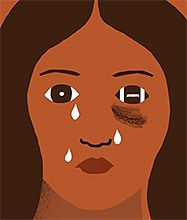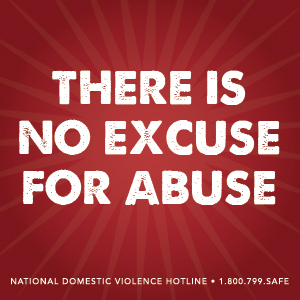Special Note:
This post, and the ones that follow in this series, originally appeared in 2014. At the request of several readers who want to share them, I have updated and re-released them hoping that they will add something to the conversation we must have in the family of Jesus. When each post in this series is released, a list of the titles and topics will be added to each article so that our readers can have access to all in this series.
Rattle.
Snap.
Clank.
No, these are not the sounds of a new breakfast cereal. These are the sounds of handcuffs on the wrists, a digital camera flash in the face, and a cell door closing behind another NFL player arrested for domestic violence, or an industry mogul that has been recently outed by the "Me Too!" movement, or another university official under investigation or indictment for the abuse (or overlooking the abuse) of women each was supposed to respect and protect. Every story should sicken us a little more than the last one.
 Behind each of these stories are the broken lives of real women and those who genuinely love them. People whose lives are now devastated because of the abuse, abandonment, blame, labeling, and marginalization they've had dumped on them. The high profile accusations and arrests are headline grabbers. Unfortunately, however, there are many other incidents — far too many — where no one of notoriety was involved, so these incidents never make the news. The tears of those in the news should remind us of the flood of tears that have fallen in silent darkness.
Behind each of these stories are the broken lives of real women and those who genuinely love them. People whose lives are now devastated because of the abuse, abandonment, blame, labeling, and marginalization they've had dumped on them. The high profile accusations and arrests are headline grabbers. Unfortunately, however, there are many other incidents — far too many — where no one of notoriety was involved, so these incidents never make the news. The tears of those in the news should remind us of the flood of tears that have fallen in silent darkness.
The rising tide of violence against women is a stain on the soul of our western culture. As we have pontificated against the demeaning treatment of women in other cultures, we have neglected to be honest about how little value we have placed on women in our own culture. We have tried to assuage our cultural conscience under the guise of equal rights. However, somewhere deep within us lies a recognition, a soul-sense, that our culture is deeply flawed. That deeply flawed reality shows up in our treatment of women. When we closely listen to our prevailing media messages about women, we recognize that our culture does not value a woman for whom she was created to be — someone precious and sacred, someone valued by her Creator, and someone that has been given as a gift to our world to do great things. We forget that when we devalue these women, we devalue our respect of God who made them!

Our western societies give the appearance that each woman has equal rights to a man. At the same time, our culture has built into our powerful systems of advertising, music, and visual media easily accepted lies of male superiority and a man's right to dominate and possess a woman. These lies portray that a woman's chief value is to be admired, desired, possessed, and used by a man as a sexual object. Our cultural solution to this debased and utilitarian view of women is to tell women they have the right to become as debauched as a man — they can view and treat men in the same way men treat women. The result is an adult population of sexual carnage and brokenness where intimacy is little more fulfilling unmanageable animalistic desires.
At the taproot of this soul-sickness is a fatal flaw: we have lost a sacred sense of personhood. A sacred sense of personhood values each person — born or unborn, young or old, rich or poor, male or female, slave or free — as a sacred and eternal person, conceived for a life of meaning and purpose and created in the image of God. Each person, whether male or female, reflects something of the Creator God (Galatians 3:26-29).
When we decide that we get to choose who is of value and who is not, we have broken part of what makes each of us truly human.
Is a person less a person based on that person's lack of productivity in our system?
Is a person less a person because of her or his being less useful or pleasing to others?
Is a person less a person because his or her needs demand most of my time, bodily energy, and focus for months at a time?
Is a person less a person because of the demands, discomforts, inconveniences, or embarrassments that person might place upon others?

Because our culture has repeatedly answered a resounding "Yes!" to these questions, we have already declared that some people are less of a real person than others. We don't have to give that "diminished person" the right to be born. We don't have to give that "diminished person" access to protection under the law or health care. We don't have to give that person time and individual attention. We don't have to support that person emotionally or financially because her or his problems are too demanding. We don't have to grant that person admittance into our group, our neighborhood, or our nations. We don't have to honor that person's sense of family. We don't have to respect that person's privacy or private possessions such as photographs. We don't have to pay attention when that person says, "No!"
Despite our protestations, we know that something deeply embedded in our culture is broken. We sense it as our world groans in the death throes of an anguish our culture can't seem to identify (Romans 8:18-25). We have bought the lies of our fallen world and forgotten a cardinal truth about abuse and our diminishment as human beings: It is sinful to use people and love things, instead of loving people and using things.
Sadly, I fear, many of us who claim to follow Jesus have not spoken grace into this culturally consuming black hole. We have politicked for family values and Christian values, but haven't changed our scale of value for women as defined by Scripture and demonstrated by Jesus. We have chosen the values of our experience instead of the radical kingdom values of our God. We have largely argued politics while demonstrating the status quo instead of providing God's redemptive model for the fallen world — new creations living out the Creator's intent and demonstrating Jesus' kingdom ethic that values each person as God does.
Today, I offer one passage for us to ponder as we pray for the Spirit to work on our hearts and mold our understandings over the next week. This passage comes from our beginning:
Then God said, "Let us make human beings in our image, to be like us. They will reign over the fish in the sea, the birds in the sky, the livestock, all the wild animals on the earth, and the small animals that scurry along the ground."So God created human beings in his own image. In the image of God he created them; male and female he created them.
. . . Then God looked over all he had made, and he saw that it was very good. (Genesis 1:26-27, 31).

From the beginning, God wanted us to know that every single person — male or female — is created in His image. The differences and the unique characteristics of each, especially when combined together in love and mutual respect, are "very good"! Each is a sacred person who bears the likeness of his or her Creator in heaven. Each has intrinsic value because she or he was carefully fashioned by God in the womb (Psalm 139:13-16). God didn't make one a first class person and the other a second class person based on gender, social standing or race (Galatians 3:26-29). To treat one as less than the other, or to speak to one as less than a sacred person, is a violation of the Creator's intent and not acceptable in the Lord's kingdom (James 3:9-12).
Today's message is just one, small, first step in our journey. Yet as small as this step may seem, it is the crucial first step.
What's our next step?
Made to be Complements: The Foundation of Reciprocal Respect
Top graphic of the battered woman with the football left eye is from the LA Times.










Reader Comments
Archived Facebook Comments